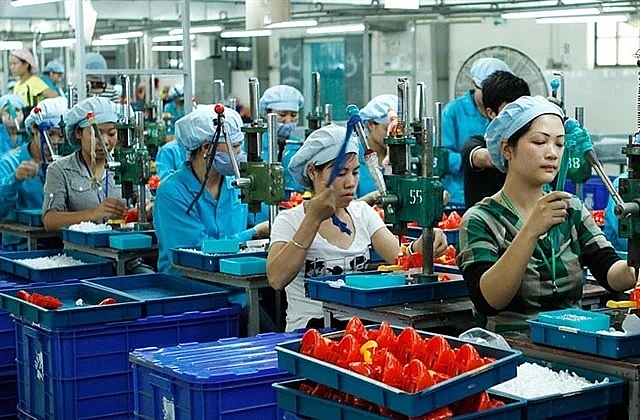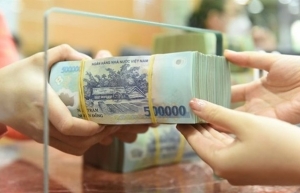Finance ministry proposes lower tax rate for micro and small enterprises
 |
| Workers at an electronic factory in the southern province of Dong Nai (Photo: VNA) |
Hanoi - To support micro and small enterprises to accumulate capital and develop business, the Ministry of Finance (MoF) has proposed lowering the corporate income tax rate to 15-17 per cent for those with a total revenue of no more than 50 billion VND (1.99 million USD), instead of the current flat rate of 20 per cent.
The tax cut, included in the draft Law on Corporate Income Tax (amended), is expected to be presented to the National Assembly for first review in October 2024 and for approval in May 2025.
Meanwhile, the ministry has been gathering feedback on the draft law from governmental agencies and the public. It said one of the drafting committee’s key objectives was to create a more favourable tax regime for micro and small enterprises.
According to the draft law, a 15 per cent tax rate is proposed for businesses with total revenue not greater than 3 billion VND, and a 17 per cent tax rate is proposed for businesses with total revenue higher than 3 billion VND and lower than 50 billion VND.
The ministry said that out of the 900,000 businesses currently operating, micro and small businesses account for nearly 94 per cent and have been earmarked for preferential policies to help them develop production and long-term revenue. During the COVID-19 pandemic, they were also beneficiaries of many of the Vietnamese government’s support programmes.
International experience shows that many countries use tax support policies as a tool to promote the development of small businesses. For example, small businesses may be granted preferential tax rates, which could be a fixed tax rate or a progressive tax rate based on income streams.
The ministry said in principle small businesses should enjoy a lower tax rate in comparison to large enterprises, but in practice, this policy will not apply to all small businesses.
According to the Law on Supporting Small and Medium Enterprises, a business is classified as small or medium if it employs an average of 200 workers and meets one of the following two criteria - total capital not exceeding 100 billion VND or total revenue in the preceding year not exceeding 300 billion VND.
Based on these criteria, micro and small businesses currently account for nearly 94 per cent of all businesses in the country, and if medium-sized businesses are included, the group of micro, small and medium-sized enterprises accounts for over 97 per cent. If these criteria were used to determine eligibility for preferential tax rates, almost all businesses in the country would qualify.
During the initial feedback process on the draft Law on Corporate Income Tax (amended), the business community expressed enthusiasm about the tax incentives, but was also concerned that some provisions in the draft law could pose policy risks.
They have called for greater clarity and stronger measures to help businesses manage risk, promote investment activities, streamline operations and create additional jobs.
 | Key issues on the global minimum corporate tax rate Corporate income tax is often considered as a variable in a multivariate foreign direct investment model. In some cases, the impact of the reduction in the rate will result in an increase in estimated investment from overseas. However, there is no correlation between lower rates and higher foreign funding globally. |
 | VCCI proposes zero tax rate to be maintained for exported services The Vietnam Chamber of Commerce and Industry (VCCI) has proposed a zero-value added tax (VAT) rate to be maintained for exported services, over worries that tax hikes would undermine the competitiveness of Vietnamese providers against foreign rivals. |
What the stars mean:
★ Poor ★ ★ Promising ★★★ Good ★★★★ Very good ★★★★★ Exceptional
Related Contents
Latest News
More News
- Private capital funds as cornerstone of IFC plans (February 20, 2026 | 14:38)
- Priorities for building credibility and momentum within Vietnamese IFCs (February 20, 2026 | 14:29)
- How Hong Kong can bridge critical financial centre gaps (February 20, 2026 | 14:22)
- All global experiences useful for Vietnam’s international financial hub (February 20, 2026 | 14:16)
- Raised ties reaffirm strategic trust (February 20, 2026 | 14:06)
- Sustained growth can translate into income gains (February 19, 2026 | 18:55)
- The vision to maintain a stable monetary policy (February 19, 2026 | 08:50)
- Banking sector faces data governance hurdles in AI transition (February 19, 2026 | 08:00)
- AI leading to shift in banking roles (February 18, 2026 | 19:54)
- Digital banking enters season of transformation (February 16, 2026 | 09:00)

 Tag:
Tag:




















 Mobile Version
Mobile Version